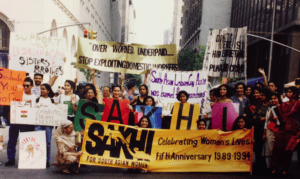My name is Huma Umar, and as part of this fellowship, I’m going to be working with Sakhi, in New York City, USA.
Sakhi is a non-profit organization advocating for survivors of gender-based violence, particularly intimate partner violence, within the South Asian community in NYC. Sakhi uses multiple modes of advocacy, They define themselves as an “intersectional, intergenerational survivor led movement for gender justice”. Sakhi’s anti-violence program offers direct services to survivors, through trauma-informed safety planning, emotional support and legal guidance, and a range of other programs within the organization work for systemic changes through lobbying for policy changes, community mobilizing and organizing.
Sakhi’s work models a culturally specific and attuned approach to advocating for and supporting survivors. An understanding of gender-based violence and its human rights dimensions needs to be situated within the sociopolitical, legal and cultural backgrounds it occurs within. At Sakhi, the specific human rights dimensions are doubly situated — while the focus of Sakhi’s work is within the South Asian community in New York City and its surrounding areas, it is also an organization working locally within the United States. Therefore, while their work is concerned with women’s rights, reproductive justice, economic and civil rights, protection against violence, it is also additionally concerned with a range of immigration and legal rights; therefore, much of Sakhi’s approach is also guided by ideas of transformative justice approaches that resist punitive measures and alternatives to criminal legal solutions as justice for gender-based violence.
The past few months of this semester, and as part of this fellowship, we’ve unpacked human rights from a range of different perspectives. As I begin my work at Sakhi’s anti-violence program, I am hoping to bridge the gap between theory and praxis when it comes to advocating for victim-survivors in trauma-informed, culturally attuned ways, and the kinds of ideas about human rights that are operationalized in the process. As I prepare for the summer, my approach is grounded in questions about ideas of intersectionality and power dynamics especially, and I look forward to complicating my understanding through my work at Sakhi.

This image from a march for Sakhi’s fifth anniversay in 1994. Marchers are holding charts highlighting a range of different issues, including domestic workers’ rights and queer rights, which speaks not just to how intertwined these various issues are, but are also evidence of the much broader network of solidarity and sisterhood within the South Asian community which Sakhi is a part of. I bookmarked this image a while ago as a reminder of the ways in which specific human rights projects borrow and share from others like them and are embedded within a broader movement for justice, and as an acknowledgement that despite the many commonalities that I do hope to locate in Sakhi’s work, coming from a South Asian country myself, there is a legacy and history that their work is grounded in that I’m simply not familiar with, and that I really hope to learn about.